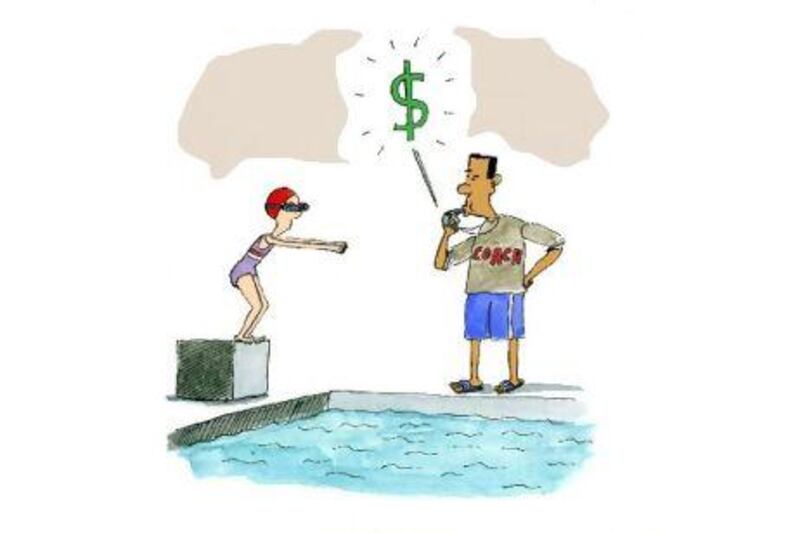I blame the million-dollar salaries and multimillion-dollar endorsements and sponsorships that sports stars reap. They are responsible for a new breed of child and parent, who see the next Tiger Woods in their one year old or another Serena Williams in their six year old.
To foster that talent, however, takes time, discipline and money. A lot of money. There's the kit to buy, the joining and coach fees, not to mention the cost of transport. It takes a lot of early mornings and long practice sessions, as well as parents who don't mind getting up at the crack of dawn to play taxi driver. And as your child reaches new levels, there are more costs associated with their success, such as competing abroad.
Only a few children will make it to the top. The rest will go on to live so-called normal lives, wondering how much more fun their childhoods might have been if they didn't spend so much time practising their chosen sport (or the one chosen by their ambitious parents). Meanwhile, the parents of the children who didn't make it may wonder how much money they could have saved if they didn't invest so much in hiring coaches and trainers, or joining expensive sports clubs to give their children a leg up in the hope that they'd be earning millions by the time they reached their teens, thereby enabling them to retire.
So if not everybody can be the next Serena or Venus Williams, or Tiger Woods (and let's face it, not many people would want to be him these days considering the car crash his private life has become), how do parents feel about all that time and money spent on training their child to - hopefully - be the best in their chosen sport?
Is it worth going into debt to help your child succeed? Many parents take out loans to pay for their child's school fees, so it's not hard to imagine that there are some mums and dads who will borrow to send their child to an elite sports academy. They see it as an investment.
But it is a rare child who will go on to get the million-dollar deals that see them supporting their parents (who have usually evolved into the agent). But in reality, it's akin to buying a lottery ticket.
Children have been known to burn out; the intensity of training and competition is too much for them to cope with. Being thrust into a world where winning is everything and losing is failure takes its toll on their confidence.
When they decide to quit, they don't think about the money. After all, it is only the grown-ups (parents, agents, sponsors) who are able to hear the ka-ching, ka-ching of a cash machine that hangs off the shoulders of a child prodigy.
Google the words "child sports stars" and you'll get some interesting results; many of them are for sports academies called, you guessed it, "Sport Stars". These are for kids aged anywhere from six months (!) to their teens. And it's big business. There's even a blog (www.dnatestingblog.com) that talks about tests that can be conducted on a child's DNA to see which sport they will best succeed at. I'm guessing that's for the most ambitious parents.
And then there are some sad stories. Take Shane Gould, a swimmer from Australia, who, at 15, set the world alight at the 1972 Munich Olympic Games after winning three gold medals, a bronze and a silver. It was the first time a female swimmer had won three individual gold medals at an Olympics - a remarkable feat for a teenager.
Up to then, her life had revolved around swimming - most days she was up at 4am, trained for two-and-a-half hours before school, then was back in the pool in the afternoon before collapsing into bed at 7.30.
A year later, at the ripe old age of 16, she announced her retirement.
"I'd lost my motivation to keep swimming and that's when I was asking questions, like there must be more to life than just winning gold medals," she is quoted as saying on the website, www.abc.net.au/schoolstv/australians/sgould.htm.
Times were different in the early 1970s and there wasn't much in the way of money when it came to winning gold. How times have changed and I wonder how difficult it would have been for her to retire if she did it now, in a world where even Olympic stars are allowed to earn millions in endorsement deals, as opposed to the original tenet of the Games, in which athletes had to be amateurs to compete.
As the parent of a child who swims, I must admit that it is sometimes hard to find a balance. I want the best for my daughter, of course, but at what cost? On the flip side, I am more than happy to pay for her to join a swimming club, which she's done - and at a reasonable cost. She's also a member of her school swimming team. Both of her coaches are great mentors and motivators - and stress the importance of enjoying what she is doing.
My daughter knows that she doesn't want to be an Olympic star - and she's not swayed by the costs of doing that. She knows, however, that she is lucky we can afford to pay for her extra-curricular activities. But, like any eight year old, she changes her mind every week about what she wants to be one day.
This week, for instance, she's planning to live with me forever, which rules out any thought of early retirement - at least for me.






